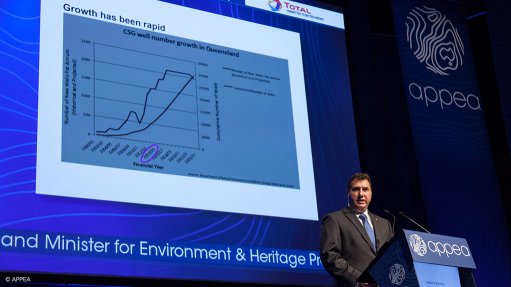
Andrew Powell
Photo by: APPEA
PERTH (miningweekly.com) – The Queensland state government on Tuesday introduced streamlined conditions for petroleum activities in the state as part of its efforts to cut red tape and reduce regulatory burden.
Minister for Environment and Heritage Protection Andrew Powell used the Australian Petroleum Production and Exploration Association (Appea) conference, in Perth, to announce the streamlined model conditions, saying that significant work had been done to streamline conditions while maintaining appropriate levels of environmental protection.
Powell said only those activities where the risks were understood and managed would be subject to the streamlining process.
“We are streamlining assessment processes for low risk activities so that officers spend less time assessing and more time determining the environmental outcomes and ensuring they are met.
“Labor thought more regulation was the only way to control business, but we know that all that does is restrict growth and the ability to create jobs and drive economic activity,” the Minister said.
He noted that the total number of conditions had been reduced by over 48%, from 442 to 232, after a review of the regulatory framework showed that several of the previous conditions were overly prescriptive and inflexible without any link to protecting environmental values.
“One of the key aspects of our election commitment to grow a four-pillar economy was our promise to reduce red tape and regulation by 20% over six years,” Powell said.
“These changes will go a long way towards delivering on that promise while maintaining high environmental standards in a rapidly growing industry.”
The streamlined model conditions, developed in partnership with industry, would reduce project costs by simplifying the administration process and field logistics, while also reducing the risk of noncompliance by removing the need to vary conditions from site to site.